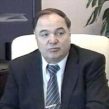
SOVMEN REMAINS PRESIDENT OF ADYGEYA, BUT KREMLIN LOOKS FOR ALTERNATIVES
Publication: Eurasia Daily Monitor Volume: 3 Issue: 87
By:

The political crisis in the North Caucasus republic of Adygeya caused by the surprise resignation of its president, Khasret Sovmen (see EDM, April 6), was resolved on April 17. That day Russian President Vladimir Putin met with the Adygei president in the Kremlin and asked him to remain in office until the scheduled end of his term next February.
The crisis was triggered by Moscow’s stubborn attempts to incorporate Adygeya into Krasnodar Krai, a region dominated by ethnic Russians. Sovmen, who has strong support from the Adygei community and civic organizations such as the Circassian Congress, has firmly resisted this Kremlin decision. Putin’s envoy to the Southern Federal District, Dmitry Kozak, has been the driving force behind the plan to unite Adygeya and Krasnodar, and he tried to force Sovmen to resign in order to install a figure absolutely loyal to the Kremlin.
On April 4 the Adygei president issued a demarche by announcing his resignation. However, his dramatic move was a bluff. Rather, Sovmen hoped to drum up local support in a defiant show of strength. The Kremlin was shocked by the staunch resistance from a regional leader but did not dare to topple him immediately. Moscow likely decided against taking any radical steps toward Sovmen, fearing not so much the Adygei president as the Circassian Congress. During protest rallies in Maykop, the capital of Adygeya, leaders of the Circassian Congress had promised to organize a “second Nalchik” in the republic if Sovmen resigned and the region united with the Krasnodar Krai (Kommersant, gazeta.ru, April 18). (In October 2005, rebels staged a lightning raid on Nalchik, the capital of Kabardino-Balkaria, that deeply embarrassed local officials.)
The prospect of unrest in the last stable sector of the North Caucasus forced the Kremlin to seek a compromise. On April 11, Sovmen was invited to the Kremlin to meet with Kozak and Sergei Sobyanin, the head of Putin’s administration (Kommersant, April 17). Putin’s formal meeting with the Adygei president on April 17, during which he asked Sovmen to remain in power, was the result of the meeting between Sovmen, Kozak, and Sobyanin.
Although Sovmen won this round, the Kremlin is still searching for a suitable successor. It is no accident that on April 17 Putin also met with Ruslan Khadzhibekov, the chairman of the Adygei parliament, who had tried to prevent Sovmen from delivering his resignation to the local legislature. The Russian authorities see Khadzhibekov as a person who, unlike Sovmen, could be easily managed from the center and who will not oppose any shift in Kremlin policy toward the region.
On April 20, Kozak met with a delegation from the Adygei parliament, headed by Khadzhibekov, in Rostov-on-Don, the capital of the Southern Federal District. After the meeting Kozak declared, “The main task of the republican parliament now is to ensure development of the economy of the republic, to attract investment, and not to engage in scheming” (Interfax, April 20). By “scheming” Kozak clearly meant the Adygei president and his standoff with the Kremlin. With these words, Putin’s envoy tried to pit the Adygei parliament against the Adygei president. Kozak declared, “There are no grounds for a ‘second Nalchik'” in Adygeya. “The republican leader [Sovmen] will work until the end of his term. We will support all his positive steps, but if there are any destructive actions we will correct him,” the envoy warned.
In his account of the meeting, Khadzhibekov said, “We will soon discuss Adygei presidential candidates, but nobody wants to force this process, the local elite and public should be consolidated first” (Kavkazky uzel, April 20). Khadzhibekov also said that a group of Adygei elders would go to Rostov to meet with Kozak, and then the envoy would come to Adygeya himself.
However, Kozak should not expect a warm reception. Twenty of the republic’s civic organizations have already refused to take part in the meeting to discuss Sovmen’s possible successors. “The multiethnic people of Adygeya have chosen Sovmen and they are not ready to give him up so easily,” said Alam Ilyasov, a leader of the Tatar community in the region. Nurbiy Gutchetl, a leader of Adyge Khase, a national movement of the Adygei people, said, “It is not correct to discuss who will be the next president when the president is still alive “(Kavkazky uzel, April 28). Some organizations of ethnic Russians in the region are also against Kozak’s idea to force discussion of the candidates. Svetlana Doroshenko, a leader of Otchizna party, said that such consultations would destabilize the republic (Kavkazky uzel, April 28).
Shocked by such resistance, Kozak again stepped up his criticism of Sovmen. “If the Adygei public had the insight of the republican leadership, it would stimulate the consultation process itself,” Fyodor Sherbakov, the envoy’s press secretary, told Kavkazky uzel (April 28).
In reality, Kozak has no interest in the Adygei people’s preferences regarding their next president. The Kremlin, which now has the power to appoint regional leaders, already has its preferred candidate — speaker of parliament Khadzhibekov. However, it is very important for the Russian authorities to make Khadzhibekov a popular figure in the eyes of the residents of Adygeya, otherwise all attempts to make him the new president will be blocked by Sovmen and Adygei nationalists, who are becoming more active, stronger and more radical. Putin, accustomed to deciding everything among his inner circle of advisors, now faces the reality of having to deal with a strong regional leader and a strong national movement. He must be cautious about using force against the Adygei people, especially given Russia’s loss of control throughout the North Caucasus.




